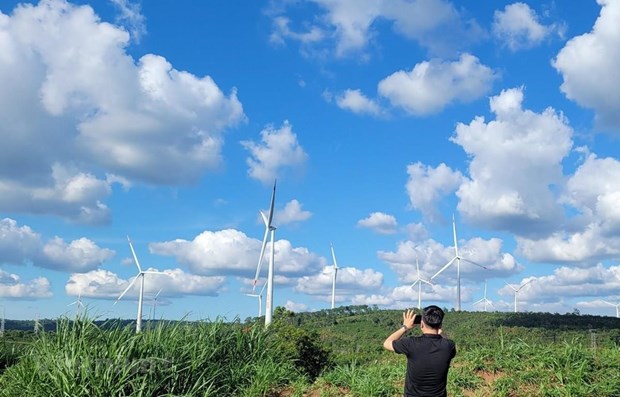Foreign partnerships vital for Vietnam’s net zero emissions
 Vietnam has promoted clean energy development as well as energy use in an economic and effective manner. (Photo: VietnamPlus)
Vietnam has promoted clean energy development as well as energy use in an economic and effective manner. (Photo: VietnamPlus)Hanoi (VNA) - Vietnam needs support from the international community in order to achieve net zero emissions by 2050, Minister of Natural Resources and Environment Tran Hong Ha has said.
At a conference on cooperation to implement the goal of achieving net zero emissions and energy transition on September 13, the Ministry of Natural Resources and Environment announced that international partners have committed to assisting Vietnam with realising net zero emissions and energy transition as committed at the 26th United Nations Climate Change Conference (COP26) last year.
Ha said that Vietnam still faces difficulties in research and development of new technologies to ensure security and balance of electricity sources in the supervision of renewable energy, carbon capture technology, and renewable energy production technology.
In addition, due attention must be paid to financial issues to attract investors and support businesses to surmount difficulties.
Therefore, support from the international community is vital for Vietnam to realise the set target by 2050, the minister underlined.
After COP26, the UN and development partners expressed their willingness to cooperate and support Vietnam to achieve net zero emissions and energy transition targets during exchanges of high-ranking officials held in various forms.
The UN, the European Commission, international organisations like the World Bank and the Asian Development Bank and countries such as the UK, Denmark, Italy and Japan stand ready to help the Southeast Asian nation in regards to energy transition and renewable energy; building and fine-tuning of institutions, policy, strategy and plan; and carbon market development, among others.
They also commit to helping Vietnam reduce greenhouse gas (GHG) emissions, bolster capacity and technology transfer as well as offer financial assistance, send experts and support climate change adaptation activities.
Vietnamese authorities have asked relevant ministries and sectors to roll out an array of activities, namely updating the Nationally Determined Contributions Registry for this year, launching a report on wind and offshore wind energy power potential in Vietnam’s coastal regions; and building a national strategy on climate change response by 2050 and another on switching to green energy.
At the event, a representative of the EU said financial mechanisms and capital mobilisation incentives have a great role to play in creating a foundation for the realisation of future targets.
At the same time, Vietnam is advised to clarify specific figures to mobilise resources.
In addition to financial matters, the development of science-technology and education will better contribute to energy transition, heard the event.
Communication must also be bolstered to ensure publicity and transparency.
As the energy industry has a crucial role in achieving net zero emissions by 2050, it requires a structural transition toward green growth.
To detail the national green growth strategy, the Prime Minister on July 22 approved the national action plan on green growth for 2021-2030 with four important goals. The goals are to reduce greenhouse gas emissions per GDP, to green economic sectors, to green lifestyles and promote sustainable consumption, and to green the transition on the principles of equality, inclusion, and resilience.
Vietnam views energy transition as both an opportunity and a challenge. It is also necessary to transition from fossil to clean energy to match the global trend. On the other hand, it is also important to guarantee energy security, change jobs for the affected workers. This is especially so for those in the coal industry. It is also necessary to ensure power prices are affordable for low-income earners, and equip the country’s manpower with necessary skills to operate advanced low-emission technologies.
Vietnam is one of the countries most affected by climate change and has a large annual total of GHG emissions (ranked 21st in the world and 2nd in ASEAN).
Vietnam's commitment to net-zero emissions shows the strong political determination of the country in stepping up economic transformation to contribute to solving the climate crisis./.













